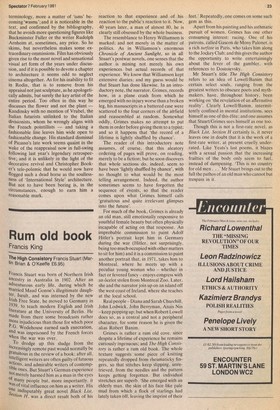Rum old book
Francis King
The High Consiatory Francis Stuart (Martin Brian & O'Keeffe £6.95) Francis Stuart was born of Northern Irish ancestry in Australia in 1902. After an adventurous early life, during which he married Maud Gonne's illegitimate daughter, Iseult, and was interned by the new Irish Free State, he moved to Germany in 1.939, to teach modern English and. Irish literature at the University of Berlin. He made from there some broadcasts rather nlore injudicious than those for which poor Wodehouse earned such execration, and was imprisoned by the French forces When the war was over.
To dredge up this sludge from the Increasingly remote past would normally be p'atuitous in the review of a book; after all, intelligent writers are often guilty of fatuous 4.ctI0ns, and admirable writers of contemptible ones. But Stuart's German experience nQt merely harmed him as a man in the eyes 91 many people but, more importantly, it was of vital influence on him as a writer. His Qnne indisputably great novel Black List, oection H, was a direct result both of his reaction to that experience and of his reaction to the public's reaction to it. Now, 40 years later, a man of almost 80, he is clearly still obsessed by the whole business.
The resemblance to Henry Williamson is marked; and not merely in the matter of politics. As in Williamson's enormous Chronicle of Ancient Sunlight, so in all Stuart's postwar novels, one senses that the author is mining not merely his own experiences but actual records of that experience. We know that Williamson kept extensive diaries; and my guess would be that Stuart has done likewise. In an introductory note, the narrator, Grimes, records how, in a plane crash from which he emerged with no injury worse than a broken leg, his manuscripts in a battered case were scattered to the four corners of the airfield and reassembled at random. Somewhat oddly, Grimes makes no attempt to put them in order before giving them to a typist; and so it happens that 'the record of a lifetime is lightly shuffled by chance'.
The reader of this introductory note assumes, of course, that this aleatory ordering of pages will prove, on reading, merely to be a fiction; but he soon discovers that whole sections do. indeed, seem to have been 'lightly shuffled by chance', with no thought to what would be the most telling arrangement. Indeed, the author sometimes seems to have forgotten the sequence of events, so that the reader comes upon what Grimes himself calls 'gratuitous and quite irrelevant glimpses into the future'.
For much of the book, Grimes is already an old man, still emotionally responsive to youthful female beauty but often physically incapable of acting on that response. An improbable commission to paint Adolf Hitler's portrait kept him in Germany during the war (Hitler, not surprisingly. being too much-occupied with other matters to sit for him) and it is a commission to paint another portrait that, in 1971, takes him to Montreal, where he meets Up with a peculiar young woman who whether in fact or fevered fancy .7enjoys congress with an Ocelot stolen from Montreal Zoo. Later, she and the narrator join up on an island off the west coast of Ireland. where she teaches at the local school.
Real people Diana and Sarah Churchill, John Lodwick, John Berryman, Anais Nin keep popping up: but when Robert Lowell does so, as a central and not a peripheral character, for some reason he is given the alias Robert Banim.
Grimes is rather a rum old cove, since despite a lifetime of experience he remains curiously ingenuous; and The High Consistory is rather a rum old book. The whole texture suggests some piece of knitting repeatedly dropped from rheumaticky fingers, so that stitches keep slipping, unretrieved , from the needles and the pattern keeps getting forgotten. But individual stretches are superb. 'She emerged with an elderly man, the skin of his face like pale mud from which a flock of starlings had lately taken off, leaving the imprint of their feet.' Repeatedly, one comes on some such gem as this.
Apart from his painting and his asthmatic pursuit of women, Grimes has one other consuming interest: racing. One of his patrons, called Gascon de Mony Palonet, is a rich turfiste in Paris, who takes him along to the Jockey Club; and this gives the author the opportunity to write entertainingly about the fever of the gambler, with references to Dostoievsky.
Mr Stuart's title The High Consistory refers to an idea of Lowell/Banim that certain select souls, ranging from the greatest writers to obscure poets and mythmakers, have, throughout history, been working on 'the revelation of-an alternative reality'. Clearly Lowell/Banim. intermittently confined in mental institutions, sees himself as one of this elite: and one assumes that Stuart/Grimes sees himself as one too.
Though this is not a first-rate novel, as Black List, Section H certainly is, it never Leaves one in doubt that it is the work of a first-rate writer, at present cruelly underrated. Like Yeats's last poems, it blazes with a sexual passion that the increasing frailties of the body only seem to fuel, instead of dampening. 'This is no country for old men. .' Mr Stuart brings out to the full the pathos of an old man who cannot but trespass in it.






































 Previous page
Previous page